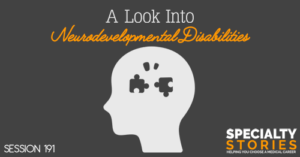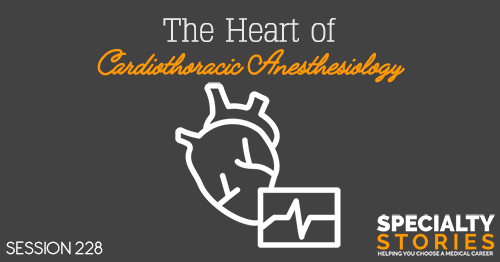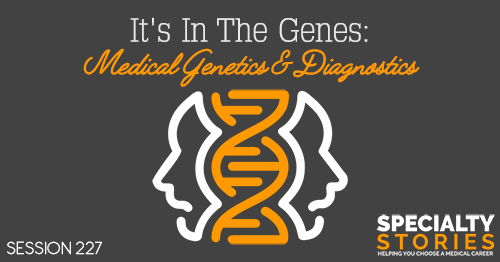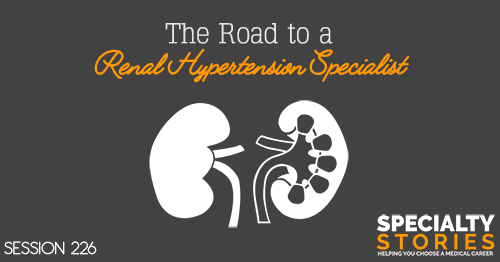Apple Podcasts | Google Podcasts
Session 191
Dr. Celanie Christensen is a Program Director who talked about how many people don’t know about Neural Developmental Disability (NDD) specialists. We also talked about how she found out about it, what she likes about it, what she doesn’t like about it, what her day looks like, and so much more. If you’re interested in pediatrics and potentially neurology, neurodevelopmental disabilities may be a specialty for you.
For more podcast resources to help you with your medical school journey and beyond, check out Meded Media.
Listen to this podcast episode with the player above, or keep reading for the highlights and takeaway points.
[01:35] Interest in Neurodevelopmental Disabilities
Celanie planned to be a child neurologist in medical school. And over time, she got more and more interested in nutrition and how it’s important for maximizing development. She also got more interested in the changes children go through as they get older, and just found that process very fascinating. She wanted to spend more time focusing on the typical developmental process and all the different things that can alter that. Ultimately, she found it to be a perfect fit for her.
[02:54] Types of Patients
As an NDD specialist, Celanie takes care of children who have developmental delays including those who have milder speech delays. She adds this field is actually good for people who are interested in a lot of different things.
For instance, she’s primarily interested in kids with genetic conditions causing developmental delays. And so, it’s what she sees most of the time. Then she also has colleagues who spend most of their time with different roles ranging from severe to mild motor disabilities to cognitive issues. They deal with intellectual severe to profound intellectual disabilities all the way up from all the way up to specific learning disabilities, and anywhere in between.
NDD specialists focus more on the developmental process than child neurologists do. They go through the same training. The residency program is divided out into two years of general pediatrics, which is the same for NDD and child neurology. And then both groups do a year of adult neurology.
Then NDD folks do 18 months of child neurology, whereas the child neurologists do two years of child neurology. Whereas developmental folks do 18 months of developmental pediatrics, where they only do development within child neurology, or if they take special electives. And so, they’ve got that extra 18 months focusing on developmental milestones and all the different health problems that can impact development.
[05:15] Traits that Lead to Becoming a Neurodevelopmental Disability Specialist Neurologist
Celanie says the ability to listen to families is very important, especially that a lot of what they do takes time. They ask about the details of when it started, what they’ve done, what they’ve noticed, and how their child responded to different therapies they’ve tried.
'There's so much that can impact or change a child's developmental trajectory, and you really have to account for all of those things.'Click To TweetCelanie says you have to be able to factor in a lot of different things. You need to tease apart the major underlying issue that needs to be addressed, but then also address all the smaller things impacting someone’s development.
[06:35] The Biggest Myths or Misconceptions Around the Specialty
Celanie says one of the biggest myths around NDD is that no one knows who they are. And because no one knows what they are and what they do, people just think they’re therapists, or that they take care of kids with autism. But it’s a lot more than that.
Children with autism are a major population they care for. But there’s a lot of other conditions that they help with and see.
What made her want to get into this specialty is that she understands that neurologists are very good at understanding neurologic function, how the brain works, and how it impacts development. She also wanted to have a better grasp on other medical problems that also impact development. Specifically, Celanie is focused on feeding, growth and nutrition because so many children with neurologic disorders, especially those that cause delays, also have feeding problems.
[09:56] How Much is the Sherlock Holmes Aspect in This Field?
Their colleagues call them the SWAT team of the hospital, since they just come in and take care of whatever is needed to be done. They see a number of patients who already have an underlying diagnosis. In that case, they look into how to maximize potential therapies necessary. They also look into other medical issues that may come up like hearing loss, which they’re screening for earlier to get it addressed as soon as possible.
They also have a large number of patients who we don’t understand why they have developmental issues. And so, they’re not only assessing developmental function, making sure people are in appropriate therapies. But they’re also considering the cause behind these developmental issues such as pregnancy, genetics, trauma, neonatal infection, etc. After considering all those factors, they try to determine a specific etiology whenever possible.
[11:17] Typical Day
Celanie describes her typical day as seeing patients most of the time. Whenever she’s wearing her clinical hat, they spend it in the clinic, specifically about an hour with every patient.
Her day mainly involves coordination of care. They’re either sending messages to the other specialists who are seeing the child saying or they work on a really big team.
'It takes a lot of people to make sure that kids are getting what they need in ways that they need it.'Click To TweetThat being said, she works closely with dieticians , social workers, genetic counselors, nurse practitioners, and even general pediatricians working under her as well.
Because there are so few NDD specialists out there, they’re looking at how they can maximize their impact. This involves communicating and coming up with a team approach that’s individualized for every patient. The downside of this is she’s spending a fair amount of time writing notes.
In terms of how much procedure is involved with NDDs, Celanie says it’s limited. They do LP or lumbar punctures and replacing G-tubes, although there are nurses that help her do this. And so, most of her job involves talking to families and kids, as well as observing different areas of their development which also involve a lot of playing games.
[14:03] The Training Path
There are eight programs within the country right now that train people to be a neuro developmental pediatrician. The training takes a minimum of six years training.
For categorical spots, you match directly out of medical school. There’s two years of general pediatrics and 12 months of adult neurology, and then 18 months of child neurology and 18 months of developmental pediatrics.
There were instances of people who only heard about NDD before they matched into either child neurology or general pediatrics. And so, it’s possible to switch after two years of general pediatrics into an NDD program and then do the required four years of training. But rarely nowadays do they have people who do the full three years of pediatrics, go out and practice for a while, and then come back and do the additional four for NDD.
Moreover, they’re looking at adding a new pathway where you do five years of child neurology, and then do an additional 12 months of developmental. Then you’d be able to sit for the NDD boards. This has not been finalized yet but they’re anticipating it will be ready in the next year or two.
In terms of competitiveness, Celanie says it’s competitive if you want to stay in a certain place since there are very few slots available nationwide. She also noticed that many are also co-applying to pediatrics and child neurology, while they have very few who only applied to NDD.
Now, if students are applying to other specialties, she doesn’t think this hurts people. Ultimately, you have to look at what you want out of life, and how important being in a certain place is.
Celanie adds it’s important to use interviews to figure out where you fit best because many different kinds of doctors will work with this patient population.
[17:16] Taking Calls and Life Outside of the Hospital
In their group, they take calls around once a week or twice a week at most. But it’s at home when they take staff phone calls from residents who are admitting patients to their service.
Celanie is happy to have a life outside of the hospital, being one of the reasons she went with this route over child neurology. She believes their lifestyle is much better. The call frequency is less frequent for them, and it’s definitely less intense. Hence, you’re more likely to get some more sleep on an NDD call than you are a child neurology call.
[18:13] Community vs. Academic Setting
Celanie describes NDD as more of an academic setting or a specialty right now. That being said, they’ve had two graduates who have gone out. They’re not working at one of the academic centers but at a children’s hospital in a medium-sized city. And so, you don’t necessarily have to stay at the academic center. So there’s lots of flexibility in what people can do with it.
'One in six children in the United States has some sort of developmental disability, according to the CDC. That's a lot of kids and there's just not enough of us.'Click To TweetAdditionally, a fair number of people who go into this are interested in research. And so that attracts people to stay at the academic center. As for Celanie, she’s not overly interested in research and likes seeing kids and teaching other people how to do it, which is the reason she stayed at the academic center.
[19:24] What Makes a Competitive Applicant for the Program
Celanie says that to be competitive, one has to have experience working with kids. Look closely at those extracurriculars that involve working with kids with autism or kids outside of the healthcare setting who have developmental issues.
Celanie also looks at scores to some extent because you need to take three boards. They obviously need people who can pass the board exams. The pediatric board is notoriously difficult, but also, child neurology is more difficult. Then the neurodevelopmental disabilities boards after you’ve gotten through the other two are super easy because that’s what you do every day. As for Celanie, she found the child neurology board to be the most difficult, which is common for many NDD graduates.
'The NDD is basically a subspecialty under the child neurology umbrella.'Click To Tweet[21:21] Overcoming Bias Towards DOs
Celanie says she personally looks very favorably on osteopathic applicants. Two of her faculty are DOs. Again, it’s about showing interest in the patient population. Celanie advises seeking out and talking to someone in the field. There are so many applicants who don’t have the opportunity to actually work with an NDD specialist due to the scarcity.
[22:29] Message to Future Primary Care Physicians
Celanie wishes pediatricians would refer for therapies the second they know a child is delayed. She expresses how it’s heart-breaking when kids show up to her clinic, and aren’t already in therapies. Or at least something or that referral has been made.
She prides on her team that’s getting better at getting people into therapies, and finding different resources. But early therapies are absolutely critical, and so, the sooner, the better. The other thing she wishes for general pediatrics to recognize is the growth aspect. Understand that if you are short, you can weigh a little bit less and still be okay. It’s more about being proportional.
“Early therapies are critical. The sooner, the better.”Click To Tweet[23:35] What She Wished She Knew Before Getting into NDD
Celanie admits she didn’t expect the amount of behavioral management was more than she expected it to be and how many things overlap with autism that actually aren’t autism. It’s a huge question that so many families and people who work with children are asking.
It’s interesting to see that the number of people or children with autism is going up and up and up. And why that is, is somewhat a challenge they’re recognizing more and more.
“Children with delays also do some things that kids with autism also do. But they may not necessarily have autism.”Click To TweetAnd so, it’s frustrating to not be able to communicate, especially that they see a lot of kids who have speech delays who just have really challenging behaviors. Hence, a lot of times, what she does for behavior problems is get them in some speech therapy and it’s surprising how well that works.
[24:51] The Most and Least Liked Things
Celanie likes how she’s able to work on the team and seeing kids make small improvements.
As long as children make slow improvements, they know they’re doing a good job or they’re doing the right things.
Many of them will not live independently, but they need to accept that and just take those small successes as joys because they are joys. And she has really come to enjoy those very small victories.
On the flip side, what she likes the least is writing, specifically the medical documentation as they write fairly lengthy notes because there’s so much to consider when you’re putting together a whole picture.
[26:25] Major Changes Coming into Field
Genetic testing is taking off like wildfire, and for her, this confirms that Celanie has made the correct decision. She was trained as a genetic counselor before she went to medical school.
The fact that you can now order a whole exome still blows her mind, even though they’ve already been doing it for seven years at this point. The next thing that will come is the genome and the actual treatments.
Now, when you look at those things for the healthcare system, the answers are different when it comes to the price tag. She suspects it’s a combination of working with drug companies on why it costs that much and working with the healthcare system in general.
[31:55] Final Words of Wisdom
If she had to do it all over again, she would still be an NDD specialist. She is willing to do the full ten years again.
Finally, she wishes to encourage premeds and medical students who might be interested in the field to pursue it because it’s exciting and challenging. The field keeps you on your toes.
Developmental specialists are needed desperately nationwide. So if this is something you’re interested in, reach out to any state, any medium or larger city because their waitlist in the past year has fluctuated from three months to six months now.
Links:
SEARCH SITE
LISTEN FOR FREE












